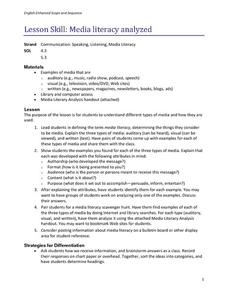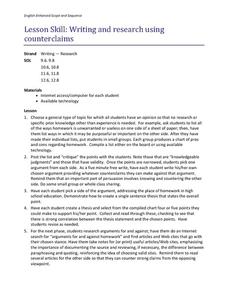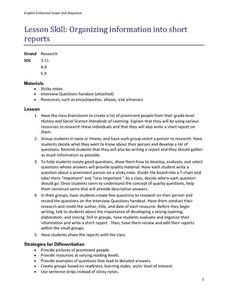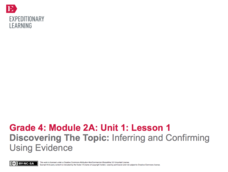Virginia Department of Education
Determining Purpose and Audience
Build the writing skills of your junior high wordsmiths with activities that introduce many essential skills of writing. As a class, they develop working definitions of formal vs. informal writing, explore different categories of...
Curated OER
Transition Words in Writing
Transition words in writing are the focus of the language arts lesson presented here. In it, learners cut out the word-sort cards (embedded in the plan), and put them into four categories: time, examples, space, and summary. They find a...
Curated OER
Narrative Writing vs. Explanatory Writing
The class discusses the different purposes an author has for writing. The focus of the discussion is on writing to tell a true story and writing to give information about a specific topic. There are writing purpose sorting cards embedded...
Curated OER
Informative/ Expository Writing
Elementary schoolers are charged with writing an article for their peers. A class discussion yields topics about which learners consider themselves to be an expert. The teacher models how to construct an article by using facts he or she...
Curated OER
Developing a Central Idea in Narrative Writing
At the beginning of the lesson, the class discusses the central idea of a poem. After that, the teacher reads a poem, embedded in the plan, to the class. In groups of two or three, learners create their own poem in response to the...
Curated OER
Writing Process- Expository Writing
Expository writing is the focus of the language arts lesson plan presented here. In it, young writers review what expository writing is through a class discussion and teacher demonstration. Then, learners write expository text that...
Curated OER
Word Reference Materials
A class discussion on reference materials opens up a lesson on how to use these important resources. They discover that dictionaries, glossaries, and thesauruses are called word reference resources, and they practice using them. The...
Curated OER
Media Literacy Analyzed
Fourth and fifth graders define the term media literacy, then come up with examples that they share with the class. The types of media studied are auditory, visual, and written. Learners get together in pairs and perform a media...
Curated OER
Context Skills
Here is a fine lesson on teaching ways to use context clues. Upper graders split up into groups and use sticky notes to cover up five words in a passage of text. The passages are rotated to the other groups, and learners must use their...
Bright Hub Education
Using Evidence and Supporting Details in Writing
In expository writing, it is important to back up claims with evidence and details. Help your class to develop their writing with notes on different types of evidence. Once they have the basics down, practice with a sample thesis and...
Bright Hub Education
Writing Effective Dialogue
Wait, there is an effective way to practice writing dialogue with your high school class? Great! High schoolers will have a blast writing dialogue using a list of potentially silly situations and an image of people talking. Employ the...
Virginia Department of Education
Writing and Research Using Counterclaims
Introduce your high school scholars as to how to use counterclaims in argument writing. Learners explore this skill with collaborative efforts and technology. Together they explore the pros and cons of homework and develop a thesis for...
Curated OER
Use Digital Photos of Scary Things to Inspire Poetry Writing
There's nothing like a provocative image to inspire a creative writing session. In the language arts lesson presented here, middle schoolers bring in digital photos of scary objects, such as a big spider, or a hornet's nest. The pictures...
Bright Hub Education
Advertisement Analysis
Middle schoolers review magazine ads and take a look at some of the most common advertising techniques. From analyzing these ads, youngsters begin to become aware of how advertisers target specific age groups, gender groups, and how they...
Virginia Department of Education
Creating Thesis Sentences
Growing writers explore what it takes to develop and support a thesis statement with pre-fabricated ideas provided by the Virginia Department of Education. Learners take notes on what makes a thesis statement and a topic sentence, and...
Curated OER
Writing a Halloween Poem
A delightful lesson on poetry is here for you and your middle schoolers. Learners are instructed to write a Halloween poem. They get to choose the age range for the audience of the poem. So, it may be scary (for older kids), or humorous...
Bright Hub Education
"A Long Way From Chicago": Character Descriptions
Complete studies of the memorable characters in Richard Peck's novel A Long Way from Chicago. The lesson describes three different activities to help your class better understand characters in the story, character development in general,...
Curated OER
Organizing Info into Short Reports
The class brainstorms a list of prominent people from their knowledge of social studies. Groups of two pupils get together and select one of these people to research. They create five questions to research on their person and record them...
Virginia Department of Education
Counterarguments
Create an urbane battle royal in class with the old Coke vs. Pepsi challenge that develops upper level high school learners skills in developing counterarguments in essay writing. The educator divides the room according to tastes, and...
Curated OER
Roots and Affixes
Fourth and fifth graders review how words can have several parts, including; roots, prefixes, and suffixes. Pupils receive a word building tiles worksheet, embedded in the plan, and they record selected roots, prefixes, and suffixes in...
EngageNY
Vocabulary: Finding the Meaning of Words in Context in The Boy Who Loved Words
Here is a lesson plan that invites learners to engage in a kinesthetic activity that allows them to physically move and manipulate words in order to think about ways to understand vocabulary in context. After that activity is complete,...
EngageNY
Independent Reading: Building The Power of Stamina
The Incredible Book-Eating Boy is read aloud to young readers, and the story is discussed. Then, the instructional activity goes into how to build up one's reading stamina. The class brainstorms ways that they can build up their stamina...
EngageNY
Learning About Farms in Colonial America: Explicit vs. Inferred Information
Aid your pupils in understanding the terms explicit and inferred while teaching them about colonial farmers. The third activity in the module builds off the previous activity and focuses heavily on inference. Learners analyze a...
EngageNY
Discovering the Topic: Inferring and Confirming Using Evidence
Allow your class to figure out what they will be studying through an inquiry-based anticipatory set that involves analysis of mystery documents and practice with making inferences. The lesson plan document includes a detailed description...
Other popular searches
- English Grammar
- English as a Second Language
- English Language Arts
- Nets Force English
- English Usage
- Future Tense English Grammar
- English Literature
- English Explorers
- English Language
- English Grammar Worksheets
- English Law
- English Civil War

























